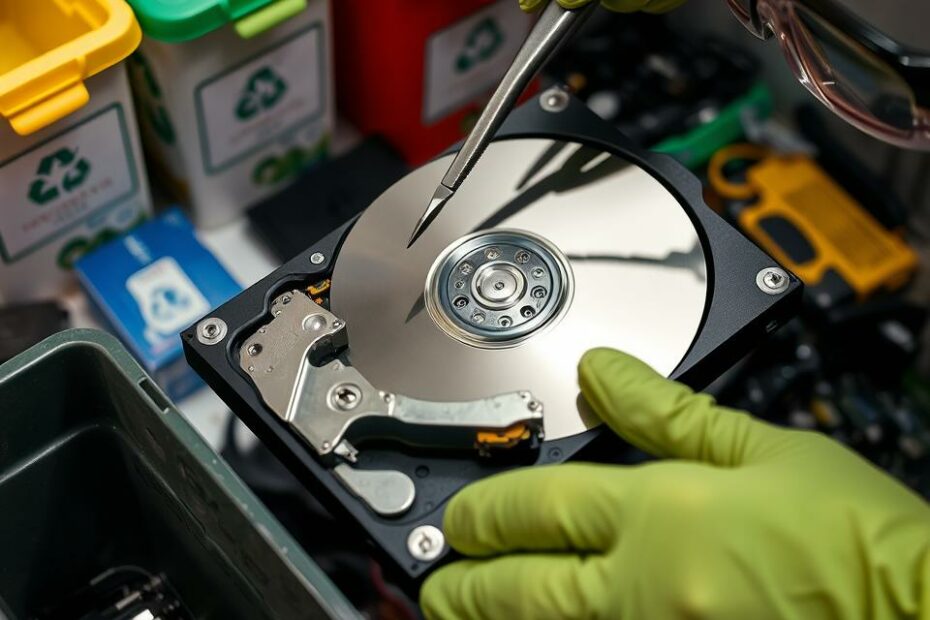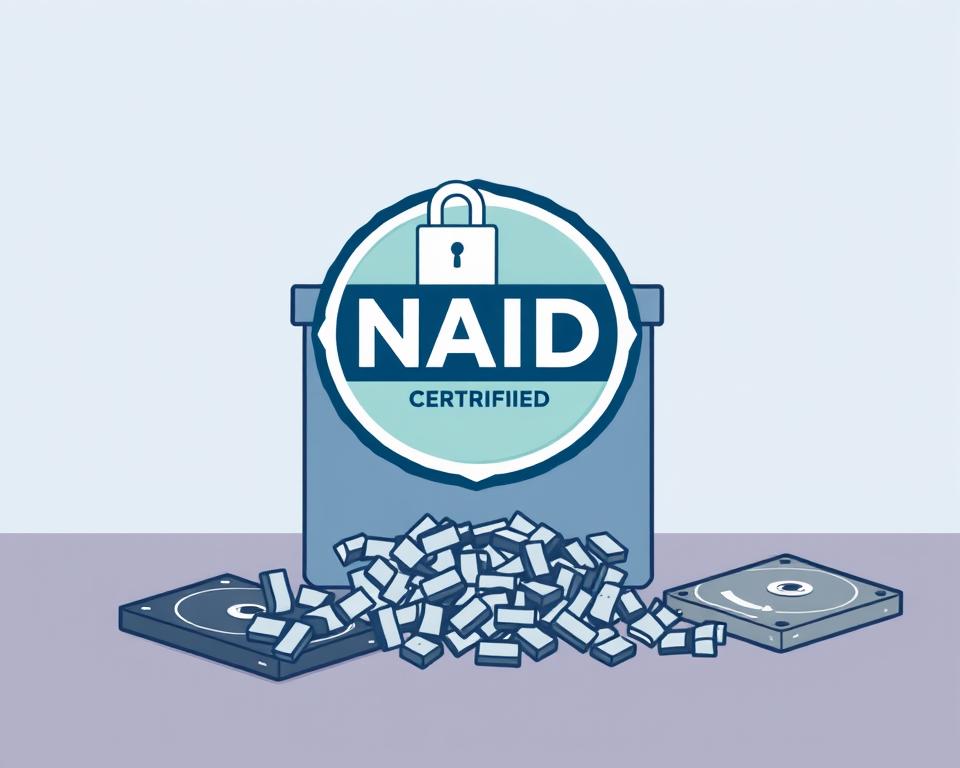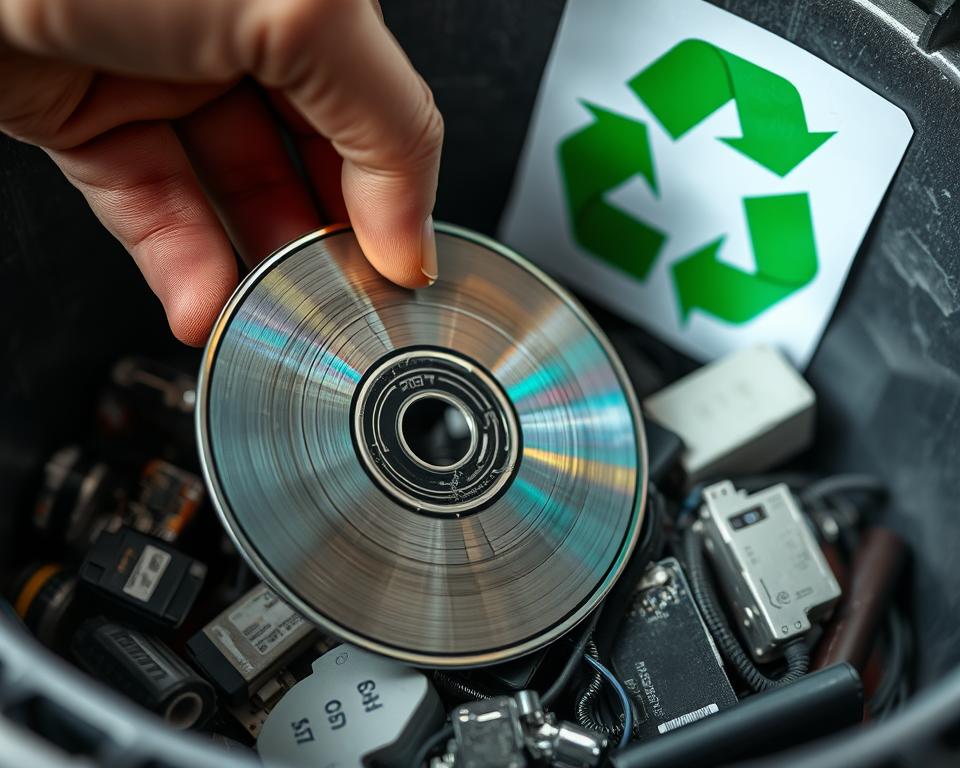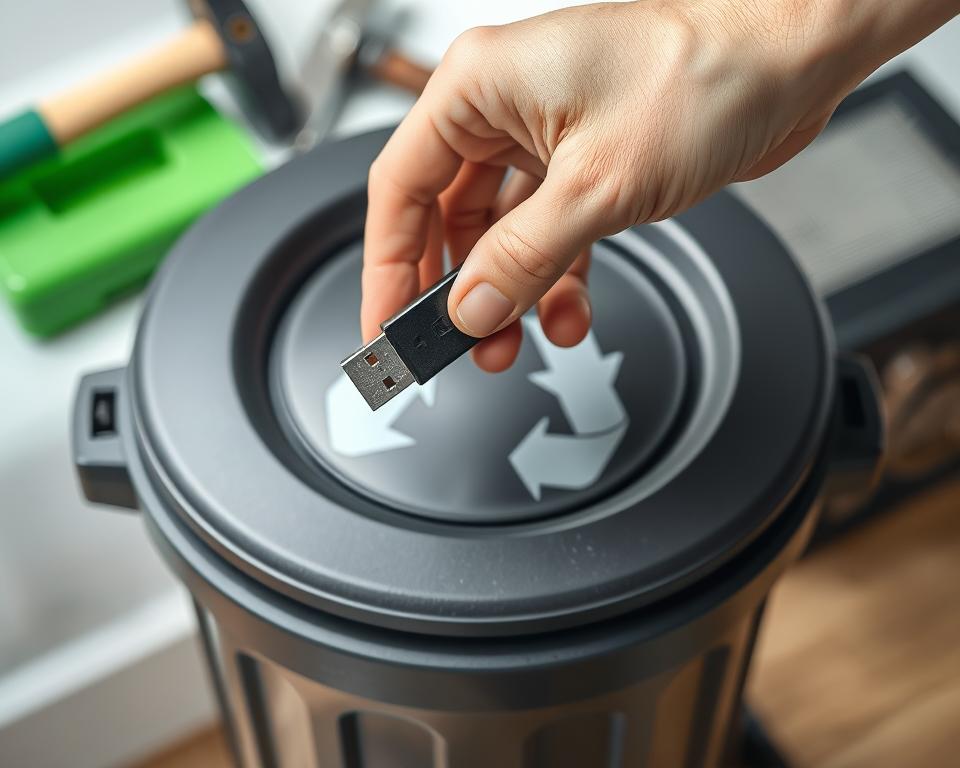I’ve seen the digital world change a lot. It’s clear how crucial it is to get rid of old hard drives right. These devices hold a lot of personal info, like financial details and passwords. If they fall into the wrong hands, it’s a big problem.
This guide is all about how to safely get rid of hard disks. It’s for anyone, whether you’re cleaning out old computers or upgrading your business’s tech. It’s not just about keeping your data safe. It also helps follow important rules like the GDPR.
Key Takeaways
- Improper hard disk disposal can lead to data breaches and compliance issues.
- The GDPR mandates the deletion and destruction of hard disks without undue delay.
- Secure data deletion methods include using data deletion software, low-level formatting, and full disk encryption.
- Physical destruction techniques like shredding, degaussing, drilling, and incineration render data unrecoverable.
- Businesses face severe penalties for not complying with data protection laws when disposing of outdated hard drives.
By the end of this guide, you’ll know why proper disposal of hard disks is so important. You’ll learn about safe ways to delete data and how to destroy it for good. Plus, you’ll find out how to do it in a way that’s good for the environment. Let’s make sure your data stays safe, even when your devices are old.
Importance of Proper Hard Disk Disposal
Getting rid of hard disks the right way is key to keep sensitive data protection safe and follow data protection laws. Hard drives hold lots of personal stuff like bank info and passwords. It’s important to wipe this data clean before throwing away the drive. Not doing so can cause big problems like identity theft and legal trouble, especially with GDPR compliance rules.
Sensitive Information Protection
The Department of Health and Human Services has seen 155 cases of data breaches in small medical groups. These breaches affected 4,518 people. This shows how vital it is to dispose of hard drives properly to keep sensitive info safe. Even if a drive is old, the data on it can still be accessed by the wrong people, causing big privacy and security issues.
Compliance with Data Protection Laws
Following data protection rules, like the GDPR, is a must when getting rid of hard drives. The GDPR says data must be erased securely, or else big fines and legal trouble can happen. Proper disposal of hard disks is key to stay in line with data protection laws and keep people’s data private.
| Data Destruction Method | Effectiveness |
|---|---|
| Data Deletion Software | 35-way writes may not be enough to fully erase data on a hard drive, as some experts can still find it. |
| Degaussing | Degaussing makes hard drives unusable by removing magnetic fields, often used by big companies for data wiping. |
| Physical Destruction | Crushing or shredding the hard drive is a sure way to destroy data, making the disk platter unusable. |
Required by the GDPR
The General Data Protection Regulation (GDPR) is a strict law in the European Union. It applies to businesses that handle personal data of EU individuals. This law stresses the need to securely erase personal data when it’s no longer needed.
Article 17 of the GDPR states that “the data subject shall have the right to obtain from the controller the erasure of personal data concerning him or her without undue delay, and the controller shall have the obligation to erase personal data without undue delay.” This rule makes proper hard disk disposal key for GDPR compliance in organizations with personal data.
| GDPR Requirement | Consequence of Non-Compliance |
|---|---|
| Secure erasure of personal data | Fines up to €20 million or 4% of global annual revenue, whichever is higher |
| Timely response to data subject requests for erasure | Potential legal action and reputational damage |
To meet GDPR data erasure and compliance needs, organizations must have strong data protection regulations. They also need secure ways to destroy hard drives and other media with sensitive info.
Secure Data Deletion Methods
Before getting rid of a hard disk, it’s key to make sure all data is deleted safely. You can use data deletion software like DBAN to overwrite data many times. This makes it impossible to get back. Low-level formatting also works by deleting data at the disk’s physical level. But, it might not be enough for very sensitive stuff.
Full disk encryption is another choice. It locks the data on the disk, so it’s useless without the right key. This is great for keeping sensitive info safe, even if the disk gets lost or stolen.
Just deleting data isn’t enough to make sure it’s gone for good. You need to use proper data sanitization methods. This is key to avoid data breaches and follow rules like the GDPR.
| Secure Data Deletion Method | Description |
|---|---|
| Data Deletion Software | Software like DBAN that overwrites data multiple times, making it irrecoverable. |
| Low-Level Formatting | Deletes data at the physical level on the disk, but may not be sufficient for extremely sensitive information. |
| Full Disk Encryption | Encrypts the data on the disk, rendering it unusable without the encryption key. |
Physical Destruction Techniques
When you need to destroy sensitive data, physical methods are very secure. Hard drive shredding cuts the disk into tiny pieces, making data recovery impossible. Disk degaussing uses strong magnetic fields to erase data. Disk drilling damages the disk’s platters, making data hard to get back. Hard drive incineration in a high-temperature furnace also destroys the disk and its data.
Shredding
Shredding the hard disk into small pieces is a very secure way to destroy it. This method makes the data on the disk completely lost. It’s a good choice for businesses and individuals who need to get rid of sensitive information.
Degaussing
Degaussing uses strong magnetic fields to erase data on a hard disk. It makes the drive unusable. But, it’s not for all storage media, and it has costs and environmental impacts to consider.
Drilling
Drilling the hard disk in several spots can also destroy data. It damages the disk’s platters, making data recovery very hard. While cheaper than shredding or incineration, it must be done carefully to avoid data breaches.
Incineration
Incineration in a high-temperature furnace can destroy hard disks and their data. It’s good for disposing of many disks at once. But, the cost and environmental effects should be thought about before choosing this method.
Disposing of Hard Disks
After deleting sensitive data or physically destroying a hard disk, it’s key to dispose of it right. There are many ways to do this, like e-waste collection centers, specialized disposal services, and corporate recycling programs.
Electronic Waste Collection Centers
Many cities have e-waste collection centers for old electronics, like hard drives. These places take in lots of devices. They make sure harmful materials are dealt with safely.
Specialized Disposal Services
Specialized disposal services offer a detailed solution for electronic waste. They are often used by public groups. They make sure all data is erased and disks are thrown away the right way.
Corporate Recycling Programs
Some companies have their own recycling programs for old devices, including hard drives. Joining these programs helps recycle old gear. It also makes sure any private data is wiped clean before it’s gone.
Choosing any of these options is crucial. It’s not just about keeping data safe. It’s also about protecting our planet. By recycling electronics, we help the environment and support a greener future.
NAID-Certified Hard Drive Destruction
For those looking for top-notch secure data destruction, NAID-certified services are the best. The National Association for Information Destruction (NAID) has strict rules for data safety and protecting the environment. This means your sensitive info is erased forever.
Companies like EWASTE+ use a detailed process that’s more than just deleting files. They use advanced tools to shred hard drives into tiny bits. This makes the data impossible to get back. It’s a way to keep your data safe and keep your customers happy and loyal.
| NAID Certification Ensures | EWASTE+ Advantages |
|---|---|
|
|
Choosing NAID-certified services from experts like EWASTE+ is the best choice for secure data destruction. You can trust them to destroy your hard drives securely. This keeps your data safe and protects your business’s reputation and customer trust.
Hiring a Hard Drive Destruction Service
Getting rid of sensitive hard drives needs a professional service. These experts have the right tools and know-how to wipe data clean. It’s important to pick the right service for your needs.
Experience and Certifications
Choose a service that’s NAID certified. This shows they follow top security standards. Also, a service with lots of experience can offer better solutions for you.
Security Protocols
The service should have strong security steps. This could be shredding, degaussing, or breaking down the drives. They should also give you detailed records to prove everything was done right.
Logging and Monitoring
Make sure the service logs and monitors the destruction process. They should keep records of what was destroyed and how. This shows they’re serious about security and following the rules.
By picking a NAID-certified service, you ensure your data is safe. They follow strict security steps and keep detailed records. This gives you peace of mind.
Disposing of Hard Disks
It’s important to dispose of hard disks properly. This protects sensitive information and follows environmental rules. Whether it’s for personal or business use, the right methods for deleting data and disposing of it are key.
Using data deletion software is a good way to keep your data safe. These tools can wipe out all data on your hard drive, making it hard to get back. You can also use low-level formatting and full disk encryption for extra security.
If you like doing things yourself, shredding, degaussing, or drilling can destroy your hard drives. These methods make the data impossible to access.
There are many ways to dispose of your hard disks. You can take them to electronic waste centers, use specialized services, or recycle them through corporate programs. These options ensure your data is destroyed and materials are recycled.
For top security and compliance, consider a NAID-certified hard drive destruction service. They use strict protocols and advanced methods to destroy your data. They also provide proof and an audit trail.
Responsible disposal of electronic waste is key for data protection and environmental care. By following the best practices for hard disk disposal, you keep your data safe and reduce environmental impact.
| Method | Description | Advantages |
|---|---|---|
| Data Deletion Software | Permanently erases all data on the hard drive | Secure, convenient, and eco-friendly |
| Physical Destruction | Shredding, degaussing, or drilling the hard drive | Ensures complete data destruction |
| Electronic Waste Collection | Recycle hard drives through designated centers | Environmentally responsible disposal |
| NAID-Certified Service | Specialized hard drive destruction service | Highest level of security and compliance |
By using secure deletion methods, physical destruction, and responsible disposal, you manage hard disk disposal well. This ensures data security, environmental care, and follows industry rules.
Conclusion
Getting rid of hard disks safely is key to protecting sensitive info and following data protection laws. By knowing the best ways to dispose of hard drives, we can make sure our data is wiped out before we throw away the drives. This also helps with managing e-waste and keeping our environment clean.
Using a NAID-certified hard drive destruction service is a smart choice. These services follow strict rules and have certifications like E-Stewards and Ecovadis. This shows they care about the planet and handle e-waste in a green way. It keeps our data safe and helps recycle valuable materials, saving energy and reducing landfill use.
The world’s e-waste problem is getting bigger, with a huge increase expected by 2030. It’s more important than ever to dispose of hard drives right and manage IT assets wisely. By focusing on keeping data safe, following environmental rules, and being green, we can help lessen the harm of e-waste. We also get to make the most of materials we can reuse.
FAQ
Why is proper hard disk disposal important?
Proper disposal of hard disks is key to protect sensitive info. It helps follow data protection laws. Hard drives hold personal and financial data that must be wiped clean before disposal. This prevents data breaches and identity theft.
What are the GDPR requirements for data erasure?
The GDPR demands data erasure when it’s no longer needed. Article 17 gives data subjects the right to erase their personal data. Controllers must do this without delay.
What are the different methods for securely deleting data from hard drives?
Secure deletion methods include software, low-level formatting, and full disk encryption. These methods make data unrecoverable by overwriting or scrambling it.
What physical destruction techniques can be used to permanently destroy hard drives?
Physical destruction methods include shredding, degaussing, drilling, and incineration. These methods physically damage the hard disk, making data inaccessible.
How should hard disks be disposed of properly?
Hard disks can be disposed of through electronic waste centers, specialized services, or corporate recycling. Proper disposal prevents environmental harm and data breaches.
What is NAID certification and why is it important for hard drive destruction?
NAID certification means a provider follows strict data destruction protocols. NAID-certified providers use verified methods and log data destruction thoroughly. This guarantees data is completely destroyed.
What should I look for when hiring a hard drive destruction service?
Look for a NAID-certified provider with experience and strong security. They should also have detailed logging and monitoring of the destruction process.





